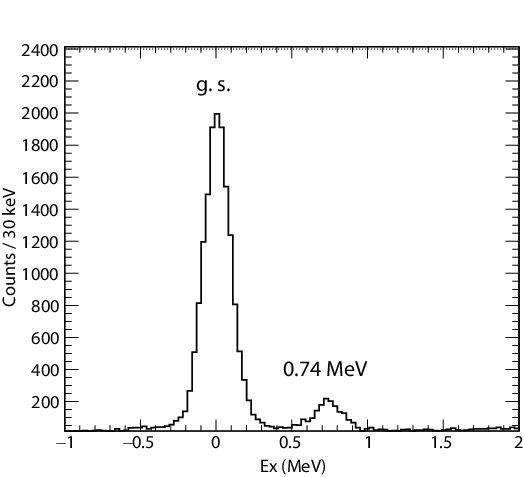| Article | |
| Report number | arXiv:2209.12252 |
| Title | Probing the quadrupole transition strength of $^{15}$C via deuteron inelastic scattering |
| Related title | Probing the quadrupole transition strength of 15C via deuteron inelastic scattering |
| Author(s) | Chen, J. (Argonne) ; Kay, B.P. (Argonne) ; Tang, T.L. (Argonne) ; Tolstukhin, I.A. (Argonne) ; Hoffman, C.R. (Argonne) ; Li, H. (Lanzhou, Inst. Modern Phys.) ; Yin, P. (Lanzhou, Inst. Modern Phys.) ; Zhao, X. (Lanzhou, Inst. Modern Phys.) ; Maris, P. (Iowa State U.) ; Vary, J.P. (Ames Lab) ; Li, G. (Peking U. ; Peking U., SKLNPT) ; Lou, J.L. (Peking U. ; Peking U., SKLNPT) ; Avila, M.L. (Argonne) ; Ayyad, Y. (Santiago de Compostela U., IGFAE) ; Bennett, S. (Manchester U.) ; Bazin, D. (Michigan State U.) ; Clark, J.A. (Argonne) ; Freeman, S.J. (Manchester U. ; CERN) ; Jayatissa, H. (Argonne) ; Müller-Gatermann, C. (Argonne) ; Munoz-Ramos, A. (Santiago de Compostela U., IGFAE) ; Santiago-Gonzalez, D. (Argonne) ; Sharp, D.K. (Manchester U.) ; Wuosmaa, A.H. (Connecticut U.) ; Yuan, C.X. (Zhongshan U., Zhuhai) |
| Publication | 2022-12-12 |
| Imprint | 2022-09-25 |
| Number of pages | 9 |
| In: | Phys. Rev. C 106 (2022) 064312 |
| DOI | 10.1103/PhysRevC.106.064312 (publication) |
| Subject category | nucl-ex ; Nuclear Physics - Experiment |
| Abstract | Deuteron elastic scattering from 15C and inelastic scattering reactions to the first excited state of 15C were studied using a radioactive beam of 15C in inverse kinematics. The scattered deuterons were measured using HELIOS. The elastic scattering differential cross sections were analyzed using the optical model. A matter deformation length δd = 1.04(11) fm has been extracted from the differential cross sections of inelastic scattering to the first excited state. The ratio of neutron and proton matrix elements Mn/Mp = 3.6(4) has been determined from this quadrupole transition. Neutron effective charges and core-polarization parameters of 15C were determined and discussed. Results from ab-initio no-core configuration interaction calculations were also compared with the experimental observations. This result supports a moderate core decoupling effect of the valence neutron in 15C similarly to its isotone 17O, in line with the interpretation of other neutron-rich carbon isotopes. |
| Copyright/License | preprint: (License: CC BY 4.0) publication: © 2022-2025 American Physical Society (License: CC-BY-4.0) |
Corresponding record in: Inspire
Record created 2023-01-11, last modified 2024-05-08


